Optimizing Hospitality Workflows: The Impact of AI in Hospitality

The advancement of artificial intelligence has had a significant impact across the hospitality industry. Professionals across multiple hospitality sectors, from short-term rentals to larger hotels and even food and beverage have been leveraging the power of AI in their day to day workflows.
Let's take a look at some real-life examples that showcase how AI and hospitality come together, to transform the way professionals are serving their guests.
Airbnb and Short-Term Rentals
Since its launch in 2008, Airbnb has changed the game in the hospitality industry by allowing everyday people to rent out their homes and properties for short stays.
And now, to keep up with the business side of managing a short-term rental business, many of those hosts are using generative AI tools which can be used in a number of ways for Airbnb, or any small short-term rental business for that matter.
Mark Simpson, founder of Boostly – a platform aimed at helping short-term rental hosts get more direct bookings, appeared as a guest on the Short Term Rental Secrets podcast to talk about how one could get started with AI for their short-term rental business.
The first step he pointed out was an important part of any marketing plan, identifying your target audience. As the saying goes; when you try to appeal to everyone, you appeal to no one. And it just happens to be one of the things ChatGPT is particularly good at. So he started by asking ChatGPT to;
"Create a market research piece for the typical type of person who visits Salem, MA for a vacation."
Some of the stand-out points that ChatGPT provided in the response are the age of the typical vacationer, the fact that they are mostly couples, where they usually travel from, and the average length of their stay. All good things to keep in mind so that you can target the language of your listing.
Then, since Boostly is geared more towards getting direct bookings, he continued by asking ChatGPT to give him ideas for social to target that audience;
"Create for me social media content ideas that will attract a 25 - 44-year-old who is looking to visit Salem, MA for a vacation."
But, if you will be listing on AirBnb, you could take the information you have about your target audience and head back to ChatGPT for help with a listing description which is exactly what we can see in these next examples.
Listing Descriptions
Thibault Masson, founder of Rental Scale-Up, had a few great ideas for creating and modifying AirBnb listings with ChatGPT.
"Create an Airbnb listing description using this input: Chamonix, vacation rental, 5 beds 3 baths, a traditional chalet in the Alps, views of Montblanc, ski piste right at the foot of chalet, fireplace."
Then, looping back to Simpson's prompt about the target audience, he wanted to take a listing and modify it for a specific audience.
"Rewrite this Airbnb listing the description to Target a family with kids: (paste description)"
And you may want to create multiple listings for the same property in order to target different audiences;
"Now rewrite this to target bachelorette parties"
You're not even limited to audiences. Maybe you want to have one listing relevant for the winter season, and another for the summer season. Masson also found that if you feed ChatGPT more detailed input, you can get a better output. So he decided to feed it a couple of real customer reviews;
"We want to write an attractive listing description for a cabin in Gatlinburg it should sound very attractive to families to do that we'll give you a draft description then we'll give you reviews from past guests so that you can lift from these reviews relevant keywords quotes of sentiments to enrich the description do not make up facts"
The next thing you'll need for your listing is a title which is one of the many prompt ideas suggested in this Tremento post;
“Can you help me come up with a catchy title for my Airbnb property located in [insert location]? It has [insert number of bedrooms/bathrooms] and [insert key amenities].”
Guest Communications
Another thing that short-term rental managers spend a lot of time doing is responding to guests' common questions before, during, and after a booking. Any Airbnb host can attest to the amount of back-and-forth communication during that process. ChatGPT can help with all those guest communications.
Automating messages for directions to the rental property, information about local attractions, check-in instructions, personalized welcome messages, recommendations for local restaurants and activities, or even a checkout list are all great things to prompt ChatGPT for.
So there are AI platforms, like GuestGuru, designed specifically for that.
So to sum up the ways that ChatGPT is being used by short-term rental managers and owners, there seems to be a logical prompt sequence that could be used to take you all the way from marketing to listing, to check-out. That would be to prompt it to come up with a target renter, create a listing using that target, modify the listing using other targets, create a title for the listing, write a personalized welcome message, and finally a list of the check-in procedures.
Food and Beverage
Another popular use of generative AI in the hospitality industry is in the food and beverage sector. And this is true from the smaller bed and breakfasts to the bigger, more well-known hotels.
Steve Turk, owner of Hospitality Mentor, shares that he often uses AI to brainstorm innovative ways to serve hotel guests and speed up the concept development process.
His most recent discovery was that he can use ChatGPT to come up with a Michelin Star-inspired menu like this one;
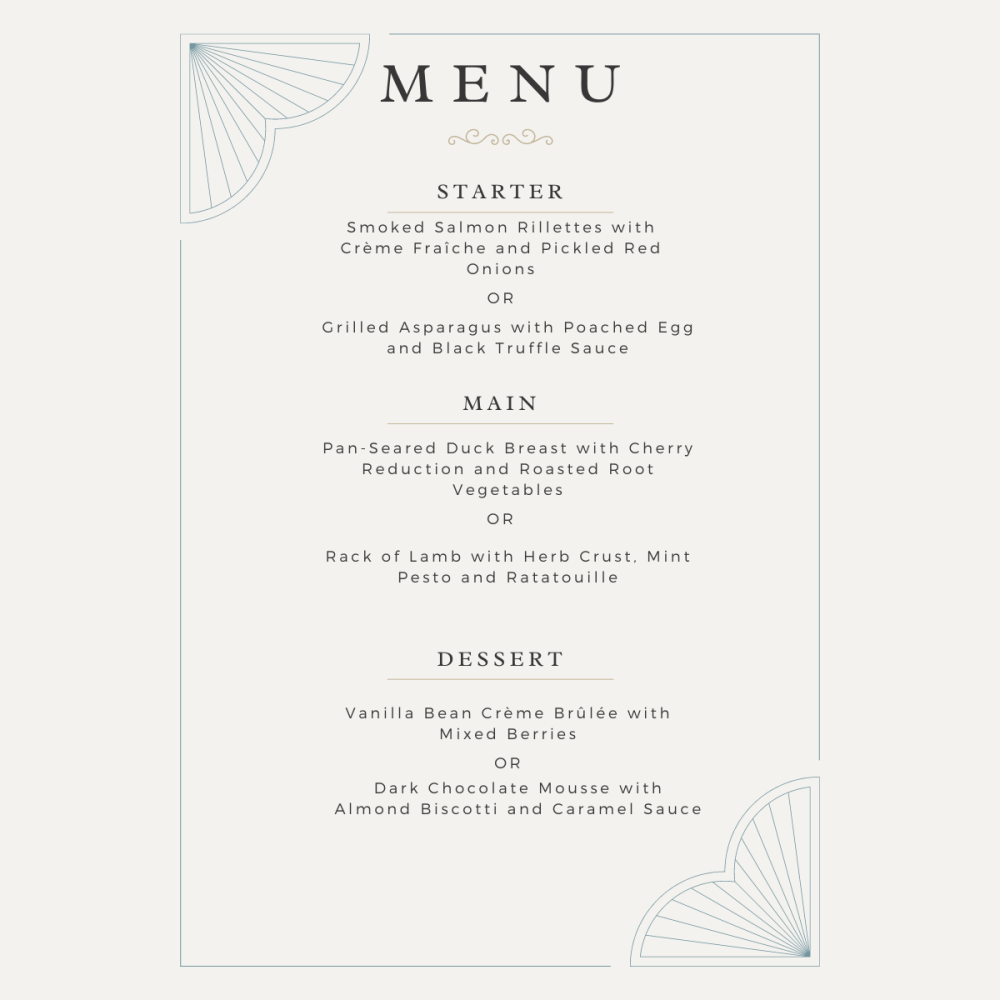
Here was his prompt series:
"Create a 3-course meal with two options per course for a luxury hotel."

"Make the food in the style of Chef Thomas Keller."
This is a really great use of ChatGPT's capabilities since you can tailor it to different styles or chefs.
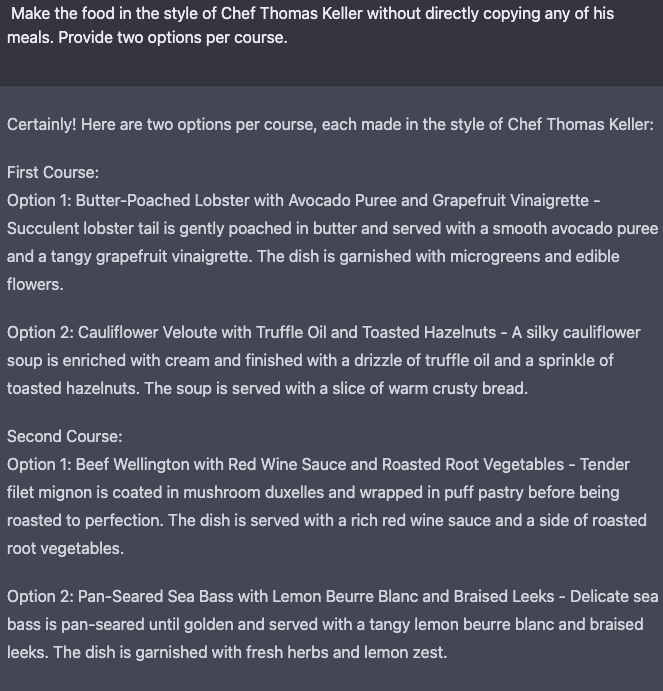
"Provide the detailed recipe for each of the items above"
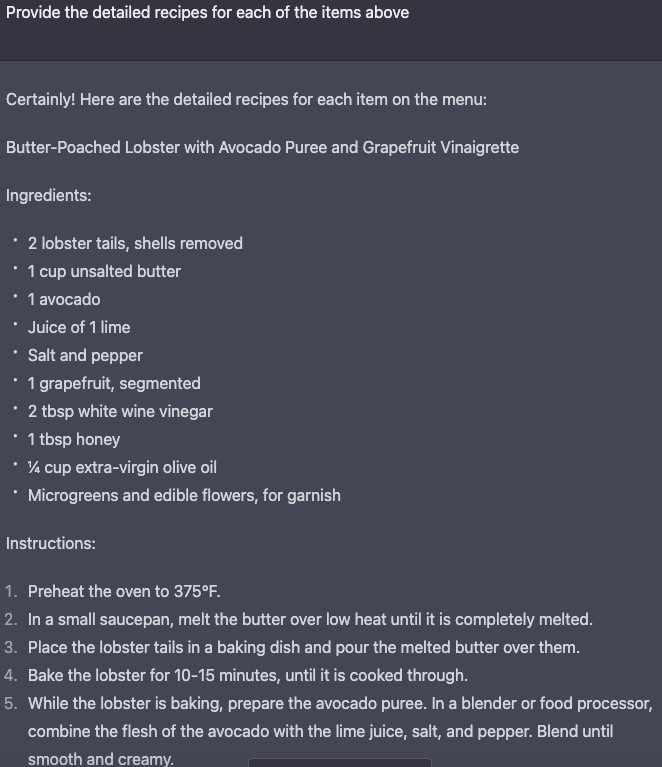
Analyzing Guest Reviews
Another great idea to leverage the power of generative AI is by getting a sense of what your hotel is doing right by analyzing guest reviews.
Fortuna Hotel Hanoi, a luxury hotel in Hanoi, Vietnam, used Google Bard to get an analysis of their hotel based on guest reviews. A great platform to use since it can search through up-to-date reviews found on Google, TripAdvisor, Expedia, and other websites, unlike ChatGPT. Their prompt was;
"Tell us Bard, what [do] our Guests love about our hotel, Fortuna Hotel Hanoi?"
And Bard's response;
"Based on my analysis of guest reviews, Fortuna Hotel Hanoi is a popular choice for travelers due to its convenient location, clean and comfortable rooms, friendly staff, and delicious food."
Now, when I typed the same prompt into Google Bard, I got a similar response along with a few specific reviews, however, I suspected the reviews were AI generated since it said one of them was from Jane Doe. So is this method 100% accurate and reliable? Maybe not quite yet.
Nonetheless, having this information on hand, if accurate, could be potentially very helpful for the hotel to find room for improvement. I decided to follow up in Google Bard to see how a few follow-up prompts would be useful in this scenario. My first follow-up was;
"What are some things guests didn't like?"
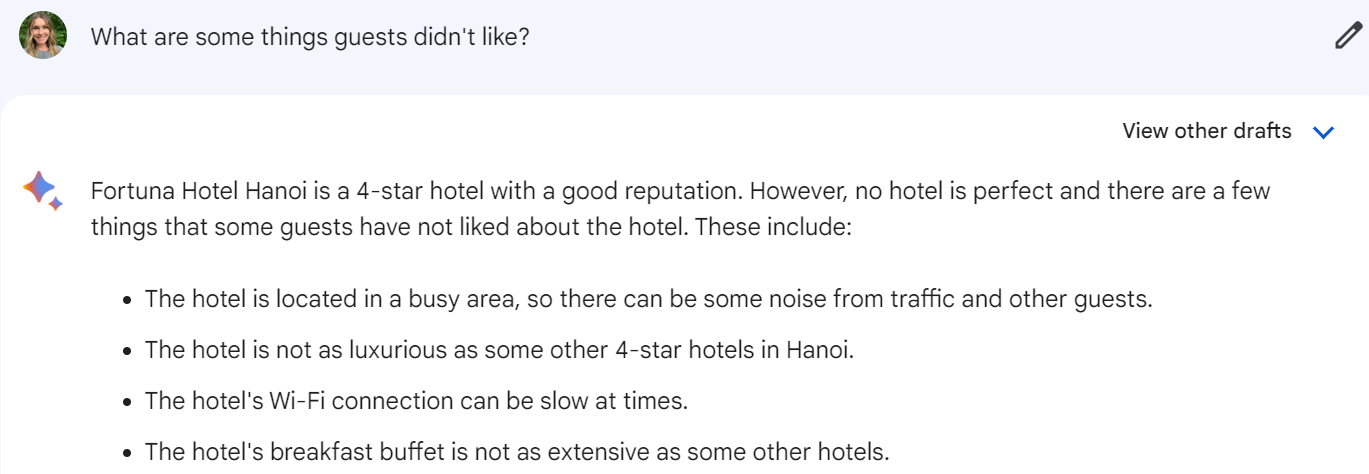
"Can you suggest some ways we can improve those areas?"
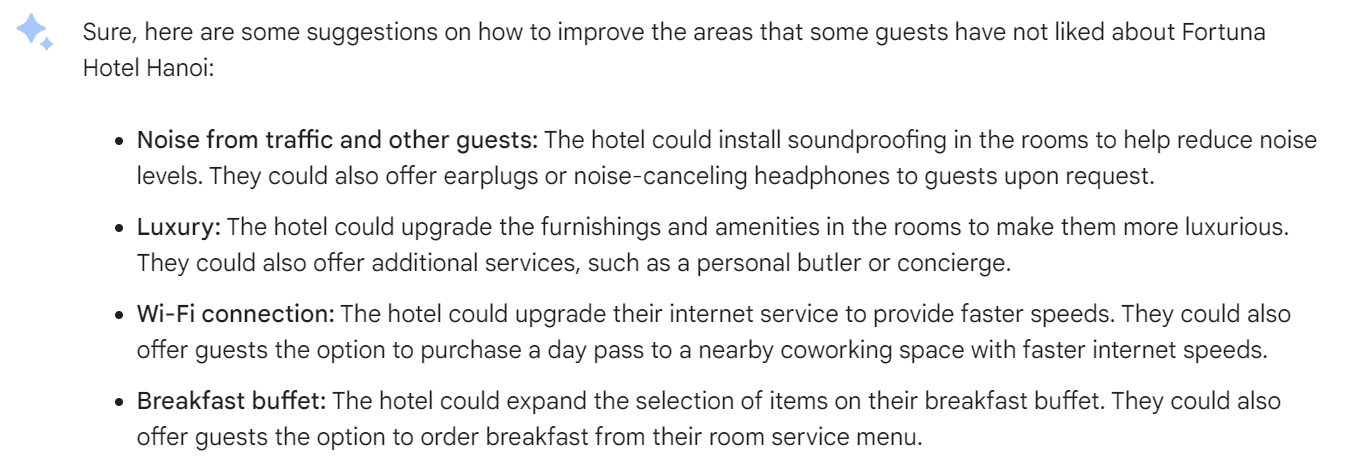
And why not go even further on that last point they mentioned to get some more specific suggestions;
"What are other hotels close to Fortuna Hotel Hanoi offering in their buffet breakfast?"
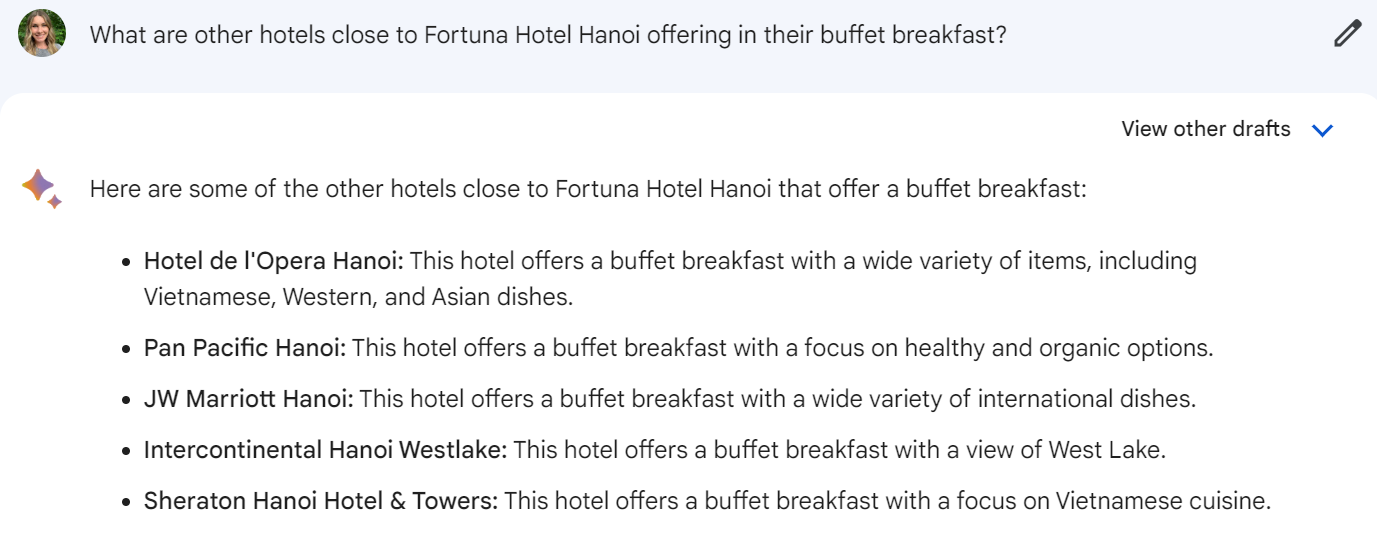
Replying to Guest Reviews
As any hotelier knows, responding to those guest reviews, whether positive or negative, is another essential part of running a successful hotel business. It shows guests that customer feedback is taken seriously, makes the hotel more trustworthy for potential customers, and it can also help the hotel's marketing efforts and SEO.
MARA AI Review Response Generator is one AI API that can help hotel owners craft well-written and personalized responses to online reviews.
MARA extracts important points from each review and creates responses that are specific to the reviewer's feedback, which makes for, what they claim to be, a better review response than you could get with conversational AI that was trained on a broader data set like ChatGPT. You can even train it to say specific things when certain keywords are detected in the reviews.
MARA gives the example of a guest complaint about dirty rooms. ChatGPT may repeat the phrase "dirty room" with a response like; "We apologize that you had a dirty room," whereas MARA knows to use more positive language and maintain a professional tone with a response like; "At our hotel, we make it our priority to maintain the cleanliness of our rooms to the highest possible standard. We apologize for falling short in your case with regards to that matter."
It can reply in multiple languages and is a simple copy-and-paste method so you can use it for reviews on any platform like Google, Booking, Tripadvisor, etc.
I think it would be cool to see a plugin that would allow you to simply hit reply and generate the text within the platform, but maybe that will come in a later version.
Customer Service
We know that businesses across many industries have started integrating generative AI technology into their chatbots to provide a guest experience that feels like a more natural language conversation. The hotel industry is no exception and many well-known hotels have also hopped on the trend.
Instead of redirecting guests to their website, hotel management can integrate AI technology into their chatbots, resulting in an overall better customer experience. Plus, the language models can be trained on a hotel's policies and best practices so that they can provide more accurate information.
Here are just a few ways some hotels are using AI chatbots in their customer service workflow;
Aloft Hotels: Use “ChatBotlr” to assist guests with hotel amenities, room rates, and check-in and check-out times.
Four Seasons Hotels and Resorts: Use a chatbot for concierge services like room service orders, spa reservations, and housekeeping services.
The Cosmopolitan of Las Vegas: Uses “Rose” to assist guests with room bookings, restaurant reservations, and recommendations for local activities.
Hotel Search Queries
I think it’s also worth mentioning how hotel search queries may change now that generative AI has come around. Mover over Expedia and Booking.com, moving forward, it will be important for hoteliers to understand how AI finds and suggests their hotels to potential guests.
Ideally, hotels would like to get customers directly to their website to make their reservations anyways rather than OTA's like Expedia and Travelocity so they can avoid paying third-party commissions and get access to first-party data which is typically done with SEO. Quicktext has a few ideas on how to use their AI to use collected data sets for better hotel SEO.
But I think moving forward, it's going to be important to consider how AI is interpreting the content to see how the AI ranks it. At the moment, I believe this is something that is yet to be defined. Out of curiosity, I wanted to see if Google Bard's suggestions matched up with what Google Maps currently displays. I asked Bard to;
"Give me a list of the best hotels in San Diego, California near the San Diego convention center."
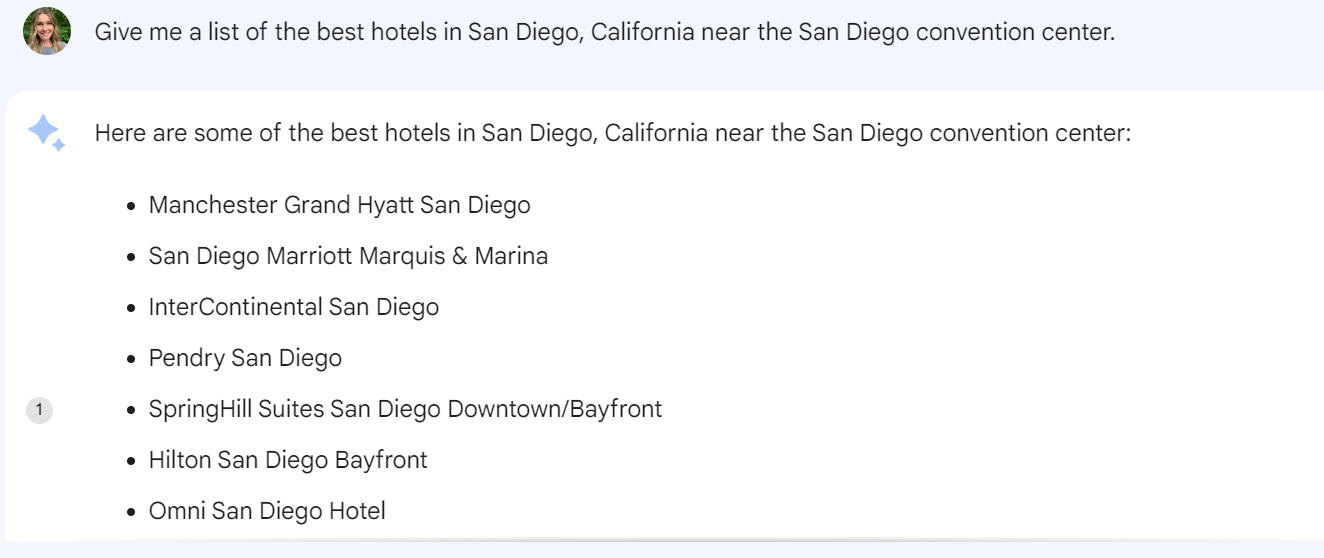
Besides the sponsored lists from Expedia, TripAdvisor, and Hotels.com, the SERP for "best hotels in San Diego, California near the San Diego convention center" populated a map of the best hotels which you can click to see the top 150 suggestions.
6 of the 10 on Google Bard's list appeared in the top 10 on the Google SERP, and 8 of them appeared on the 1st page.
Conclusion
So AI has definitely hit the hospitality industry, opening up incredible possibilities for hosts, hoteliers, and service providers. And the journey has only just begun!
As AI technology keeps advancing, it's set to become even more indispensable in key areas like customer service, hotel search queries, and making data-driven decisions.
By tapping into the power of AI, the hospitality industry can reach unprecedented levels of efficiency, personalized service, and competitiveness, setting the stage for a future where seamless interactions, exceptional service, and memorable stays become the norm.